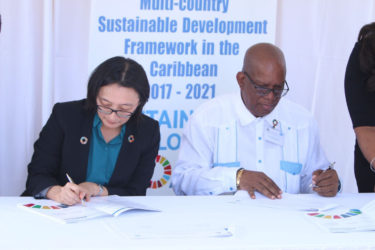Guyana yesterday became the first of 18 Caribbean countries to sign the United Nations Multi- Country Sustainable Development Framework (UN-MSDF), which will see a radical shift in the way assistance is delivered.
The regional programmatic framework, which will coordinate the activities of 19 UN Agencies and 18 countries, replaces the country specific United Nations Development Assistance Framework (UNDAF). Over the next five years, 2017 to 2021, it will cover the UN system across Barbados, and the Organization of Eastern Caribbean States, Belize, Guyana, Jamaica, Suriname and Trinidad and Tobago.
UN Resident Coordina-tor Mikiko Tanaka explained to those gathered on the lawns of Public Buildings yesterday that the UN-MSDF brings to the Caribbean the “UN delivering as one” approach. The framework brings to the region one programme with one budget, operating under one leader with joint oversight and ownership agreed between the government and UN. The starting budget is US$197.9 million.
Tanaka noted that the framework will allow the UN to collaborate with regional entities such as Caricom to tackle common challenges in the region and work with the Government in the four MSDF pillars
Individual UN agencies will, however, continue working with mandated expertise with line ministries, Tanaka said. She further explained that the UN intends to “deliver as one” by addressing multi – dimensional developmental issues together.

Noting that the 17 UN sustainable developmental goals are interconnected with deep root causes, Tanaka said that resolving these issues requires coordinated action between line ministries, institutions nationally, regionally and locally.
Additionally the UN system will jointly strengthen data systems in Guyana for evidence-based policy making, planning, monitoring and reporting; a meaningful exercise which should enable the government to target, deliver and report results through their normal work.
Tanaka also stressed that human development will be a common objective and approach.
This approach was hailed by Prime Minister Moses Nagamootoo, who said that the aim of the UN MSDF is to ensure that no one is left behind in national development efforts, and exemplifies the commonly-shared belief that the similar development challenges of the Caribbean countries require a coherent and coordinated response by the United Nations.
He further noted that the UN MSDF acts as a mechanism that would decrease the administrative burden on national governments and prompt a more coherent response to regional and national challenges, needs, and priorities while focusing on four priorities: An Inclusive, Equitable and Prosperous Caribbean; a Healthy Caribbean; a Safe, Cohesive and Just Caribbean; and a Sustainable and Resilient Caribbean.
Meanwhile, Minister of Finance Winston Jordan, who signed the framework on behalf of government, noted that this synergy represented in the UN-MSDF is closely related to government’s own policies and programmes, which are designed to tackle poverty within vulnerable communities.
He explained that very soon a green development pilot programme for multi-dimensional poverty reduction will be launched in regions One, Five, Nine and Ten. “The UN country team is already engaged in different levels, and interventions, in this regard,” the minister said before encouraging all ministers and others stakeholder to embrace the aims of the programme.





